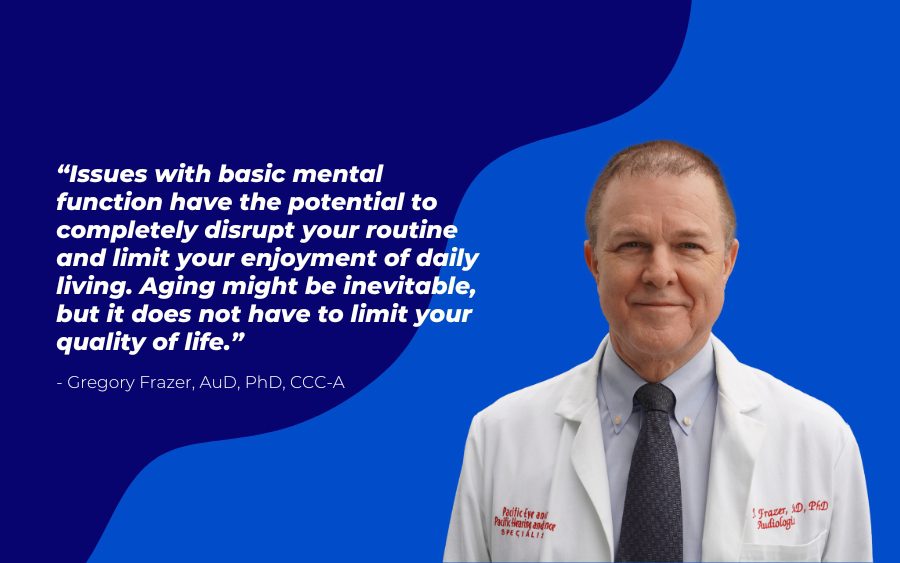As you age, many of your senses, especially your hearing, begin to deteriorate. The end result is reduced sensual sensory stimuli to your brain, leading to slower mental processing, reduced retention, and difficulty focusing on what you are doing and where you are going.
While this is considered normal, it isn’t something that has to completely take over, reducing how you interact with others and limiting what you are able to accomplish as you get older.
I recently ran across a publication from Harvard Medical School revealing 7 secrets to better mental focus and steadfast concentration. I highly recommend that you take a deeper look into this publication.
While the information in this publication is proprietary, I would like to share some of my thoughts in relation to improving your mental focus as you age as part of my commitment to helping you improve your overall health and quality of life.
What Is Cognitive Decline?
For a better understanding of how to improve your mental focus as you age, it is necessary to understand what is taking place when you begin to experience cognitive decline.
On its most basic level, cognitive decline involves the changing or deterioration of connections between neurons (brain cells) as you age. As these connections continue to break down, you begin to experience gaps in your memory and concentration.
Early cognitive decline is usually recognizable by the appearance of several symptoms, including:
- Losing your way in a place familiar to you.
- A struggle to learn and remember names.
- Reading without retention of the material.
- Misplacing items you use regularly or value.
- Struggling to keep up during social engagements (often linked to hearing loss).
- Forgetting words that you have used all your life.
- Decreased performance at work or while engaged in tasks that require focused attention.
Issues with basic mental function have the potential to completely disrupt your routine and limit your enjoyment of daily living. Aging might be inevitable, but it does not have to limit your quality of life.
5 Foundational Principles for Maintaining Focus and Concentration
1. Mindfulness
Whether through meditation, prayer, or some other contemplative exercise, mindfulness is critical for reducing stress and improving your breathing. Breathing is among the most beneficial activities in which you can engage, as it allows for improved cellular oxygenation.
If you have the capacity to incorporate a long period of focused mindfulness into your day, that’s great, but you can reap a lot of benefit from shorter sessions scattered throughout your day.
Begin with basic breathing exercises: breathe in for four seconds, retain for four, and breathe out for four.
2. Sticking to a Routine
A daily routine acts as a roadmap as you go through your day. It helps organize what you are doing and allows you to focus on a specific task without thinking ahead to other things you need to do.
Plan out your day the night before, blocking out time slots for focused activities and incorporating activities that will help improve your mental focus. To see the most success, you will need to stick to your routine as strictly as you can manage.
3. Prioritizing Sleep
Were you aware that your memory, decision-making capabilities, and concentration suffer whenever you don’t get enough sleep? The key to getting 7 to 9 hours of sleep every night is in how you plan for it and make it a priority.
Here are the steps to better sleep:
- Step 1: Set a consistent bedtime as part of your daily routine.
- Step 2: Remove cell phone, computer, and television screens from in front of your eyes.
- Step 3: Establish a pre-sleep routine, like reading or listening to relaxing music.
- Step 4: Practice focused breathing and de-stress.
Take a moment to review this publication from Web MD, as it relates to how a lack of sleep affects your mind.
4. Feeding Your Brain
Like the other organs of your body, your brain needs certain nutrients to make it function better. Keeping your brain adequately hydrated (8 to 10 glasses of water per day) is the first and most important way to feed your brain.
Junk food with lots of chemicals, processed flour, and sugar will keep your brain sluggish and distracted. Incorporate antioxidants and vitamins from whole foods (supplements when necessary), like fatty fish, berries, nuts, leafy greens, and avocados.
5. Keeping the Blood Flowing
Physical exercise is a game changer when it comes to brain health. The more you move, the more oxygen-rich blood your heart pumps into your brain, enhancing its performance and promoting mental clarity.
Try to incorporate aerobic activities like jogging, swimming, or cycling into your daily routine at least three times per week. Incorporating yoga poses, stretching, and walking into your mindfulness routine provides a double benefit by reducing stress and improving blood flow.
Your Hearing Health Plays a Critical Role in Your Cognitive Health
Numerous studies have established that there is a link between untreated hearing loss and cognitive decline. The link is related to a form of brain atrophy that occurs because your brain is no longer receiving adequate audio-sensory stimuli from your ears.
Many of these same studies show that the use of hearing aids slows cognitive decline as well as provides greater motivation to engage in a more active lifestyle.
So, if you are experiencing some hearing challenges as well as struggling to remain focused, look to Pacific Hearing Inc. for solutions to both so your rich, rewarding lifestyle continues without interruption.
Contact us by using this link to learn more about how better hearing improves your overall health and quality of life, or give us a call at (310) 909-0180.



